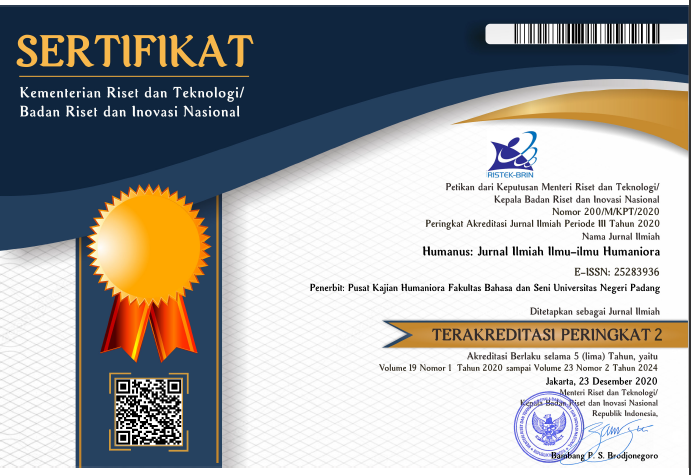Lebanon Shiite Woman in the Middle of Discrimination Feminist Literary Criticism Analysis of the Novel Hikayah Az-Zahra
 ),
), (1) Universitas Ahmad Dahlan
 Corresponding Author
Corresponding Author
Copyright (c) 2020 Humanus
DOI : https://doi.org/10.24036/humanus.v19i1.104527
Full Text:
 Language : ind
Language : ind
Abstract
Keywords
References
As-Syaikh, H. (1989). Hikayah Az-Zahra. Lebanon: Dar el-Adab.
Culler, J. (1983). On Deconstruction: Theory and Criticism After
Structuralism. London: Routledge and Keagan Paul.
Elmorally, R. (2017). Gender Dynamics During and Post The Lebanese
Civil War 1975-1990 Through A Marxist Feminist Perspective.
International Journal of Scientific & Technology Research, 6, 142–147.
Farhood, L. (1999). War Trauma and Women: Predisposition and
Vulnerability to Adverse Psychological Health Outcome. In L. R. Shehadeh (Ed.), Women and War in Lebanon (pp. 259–271). Florida: University of Florida Press.
Goldman, J. (2006). The Cambridge Introduction to Virginia Woolf. Cambridge: Cambridge University Press.
Loughnan, S., Campos, S. F., Vaes, J., Anjum, G., Aziz, M., Harada, C., … Tsuchiya, K. (2015). Exploring the Role of Culture in Sexual Objectification: A Seven Nations Study. Revue Internationale De Psychologie Sociale, 28(1), 125–152.
Marusek, S. (2018). Faith & Resistence: The Politics of Love and War in Lebanon. London: Pluto Press.
Rich, A. (1995). Of Woman Born: Motherhood as Experience and Institution. New York: W.W. Norton & Co.
Said, J. (2013). Unequal and Unprotected Women’s Rights Under Lebanese Personal Status Law. Retrieved from https://www.hrw.org/report/2015/01/19/unequal-and-unprotected/womens-rights-under-lebanese-personal-status-laws
Salloukh, B. F., Barakat, R., Al-Habbal, J. S., Khattab, L. W., & Mikaelian, S. (2015). The Politics of Sectarianism in Postwar Lebanon. London: Pluto Press.
Showalter, E. (1985). The New Feminist Criticism. New York: Pantheon Books.
Szmrecsanyi, B. (2006). Morphosyntactic Persistence in Spoken English. (W. Bisang, H. H. Hock, & W. Winter, Eds.). New York: Mouton de Gruyter. https://doi.org/10.1515/9783110197808
Xiao, L., Li, B., Zheng, L., & Wang, F. (2019). The Relationship Between Social Power and Sexual Objectification: Behavioral and ERP Data. Front. Psychol. https://doi.org/https://doi.org/10.3389/fpsyg.2019.00057
Zed, M. (2008). Metode Penelitian Kepustakaan. Jakarta: Yayasan Obor Indonesia.
 Article Metrics
Article Metrics
 Abstract Views : 498 times
Abstract Views : 498 times
 PDF Downloaded : 193 times
PDF Downloaded : 193 times
Refbacks
- There are currently no refbacks.
Copyright (c) 2020 Humanus

This work is licensed under a Creative Commons Attribution-NonCommercial 4.0 International License.










